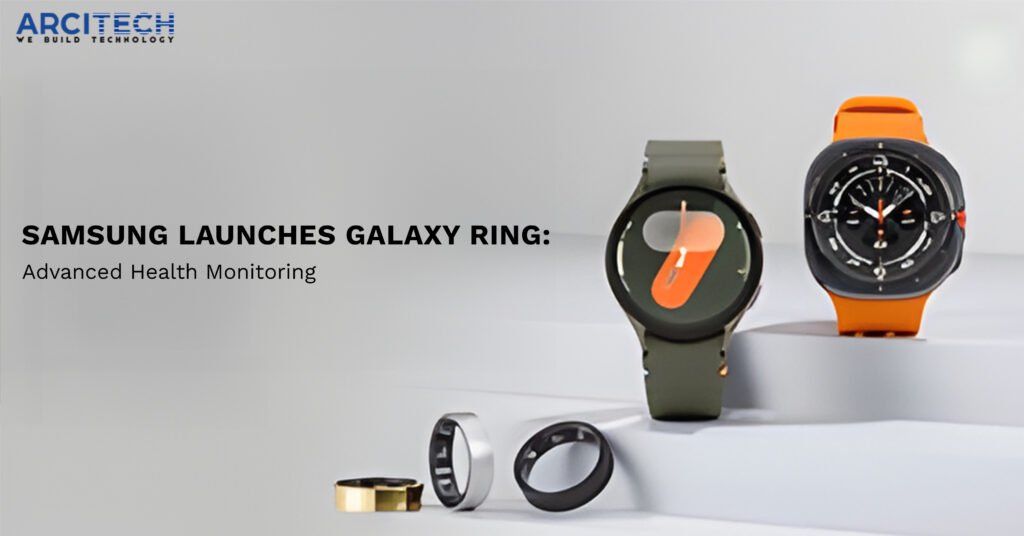Samsung has officially ventured into the “smart rings” market with the launch of the Galaxy Ring, announced at the Galaxy Unpacked event on Wednesday. This marks a significant step for the South Korean tech giant as it seeks to integrate its ecosystem of products, including smartphones and wearables, and offer advanced health-tracking features, positioning itself as a strong competitor to Apple in the health tech space.
Entering a New Product Category
The Galaxy Ring is Samsung’s first foray into smart rings, a category that has seen growing consumer interest. This new product comes at a time when smartphone sales are showing signs of recovery, yet users are holding onto their devices for longer periods. As a result, device makers are exploring add-on electronics products to boost sales. The Galaxy Ring is designed to complement Samsung’s existing portfolio, enhancing the health-tracking capabilities of its smartphones and smartwatches.
Advanced Health Monitoring
The Galaxy Ring is equipped with a range of sensors to provide 24/7 health monitoring. According to Samsung, the data collected by the ring is analyzed using the company’s Galaxy AI algorithms, delivering personalized insights and tailored health experiences. Here are some of the key features the Galaxy Ring offers:
- Sleep Tracking: The ring monitors various sleep metrics, including movement, sleep latency, heart rate, and respiratory rate, providing comprehensive sleep quality analysis.
- Menstrual Cycle Tracking: Utilizing skin temperature data, the ring can monitor and predict menstrual cycles.
- Heart Rate Monitoring: The device alerts users when their heart rate is unusually high or low, and allows real-time heart rate checks.
- Exercise Detection: The Galaxy Ring can automatically detect and track different types of physical activities, providing users with detailed workout data.
Design and Battery Life
Weighing between 2.3 grams and 3 grams depending on the size, the Galaxy Ring is designed to be lightweight and comfortable for continuous wear. It features a battery life of up to seven days, supported by a portable charging case similar to those used for wireless earbuds. The ring is available in three colors and is priced at $399.99, with pre-sales already underway and in-store availability starting on July 24.
Integration with Samsung Ecosystem
Samsung is positioning the Galaxy Ring as an integral part of its ecosystem, designed to be used alongside its smartphones and smartwatches. This integration is aimed at providing users with a more comprehensive view of their health metrics. For instance, when the Galaxy Ring is paired with a Samsung smartwatch and smartphone, users receive a detailed analysis of their health, especially sleep data, as the devices collect information from multiple sources. This interconnectedness enhances the functionality of each device, driving users to invest in multiple Samsung products.
Competitive Edge and Market Potential
The introduction of the Galaxy Ring could significantly impact the market currently dominated by Oura, a pioneer in smart rings with over 2.5 million units sold since its founding in 2013. Oura holds 52% of the market share, but Samsung’s extensive reach and marketing power could shift the dynamics. Analysts, such as Paolo Pescatore from PP Foresight, believe the Galaxy Ring could drive smartphone sales and attract users to Samsung’s platform.
Francisco Jeronimo, vice president for devices research at IDC, highlighted the importance of expanding the ecosystem. This ecosystem approach has been a successful strategy for Apple, and Samsung aims to replicate this success.
Future Prospects
While the Galaxy Ring is not expected to be a high-volume seller compared to smartphones, it represents an important addition to Samsung’s wearables portfolio. Ben Wood, chief of research at CCS Insight, noted that the Galaxy Ring fits well with the growing consumer interest in health tracking. He also mentioned that although the ring is a niche product, Samsung’s market reach and marketing budget could establish the smart ring market on a larger scale.
The Galaxy Ring could also open up new revenue streams for Samsung, particularly in software and services. Users can access their health data via the Samsung Health app, and the company is considering a subscription service for the app, as mentioned by Hon Pak, head of the digital health team at Samsung.
Conclusion
The Galaxy Ring is a strategic moveGalaxy Watch Ultra Titanium Gray – Specs & Features | Samsung India by Samsung to expand its ecosystem and offer consumers advanced health monitoring capabilities. By leveraging AI technology and integrating with its existing products, Samsung is poised to make a significant impact in the wearables market. The Galaxy Ring, along with the newly launched Galaxy Watch 7 and Galaxy Watch Ultra, showcases Samsung’s commitment to innovation and its efforts to provide comprehensive health and fitness solutions.
As the smart ring market grows, the Galaxy Ring could become a key player, driving user engagement and offering new opportunities for Samsung in the health tech space. With its official release set for July 24, consumers and industry watchers alike will be keen to see how this new product performs and how it influences Samsung’s market position. For more updates on cutting-edge AI solutions, visit Arcitech.ai and explore our comprehensive suite of innovative services designed to drive your success.

